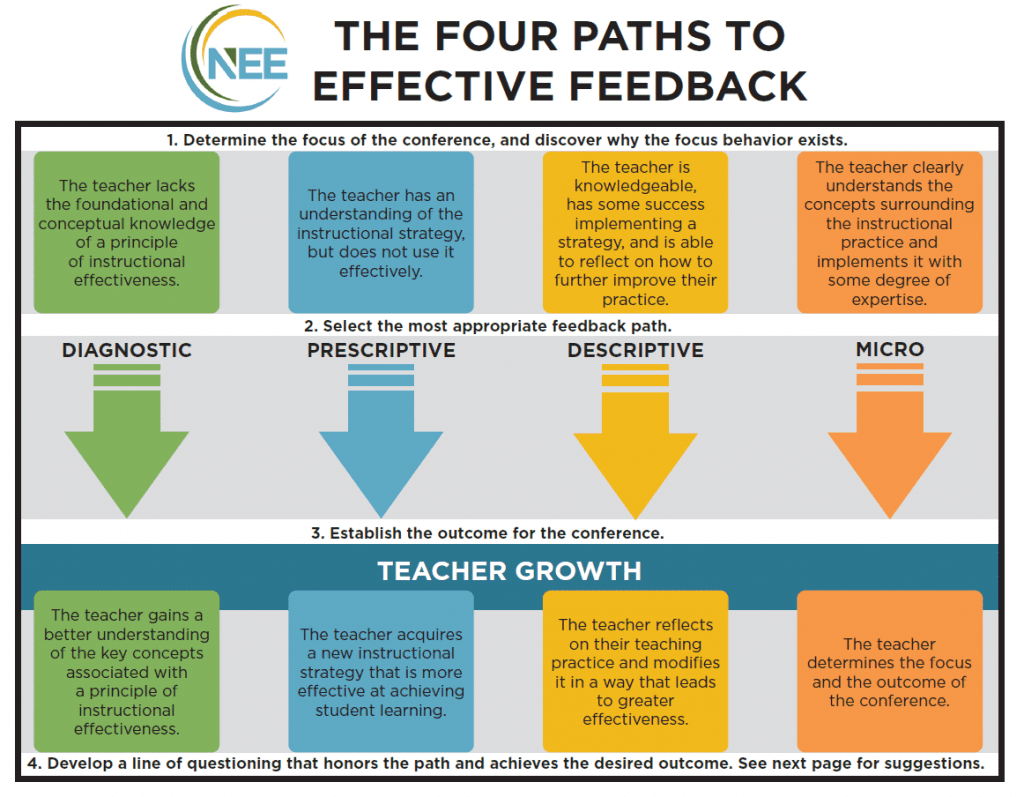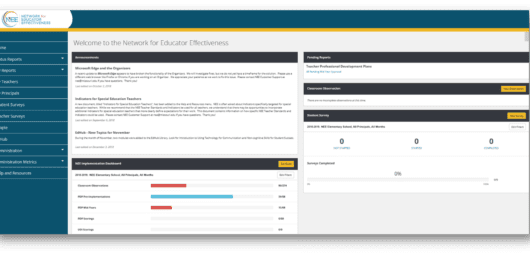Motivating Teacher Growth with Diagnostic Feedback
There are times an evaluator conducts a classroom observation in which the teacher fails in their lesson due to a lack of understanding of an instructional concept. Using NEE’s Four Paths to Effective Feedback will lead the evaluator to use the diagnostic feedback path during the observation conference.
The diagnostic feedback path requires the evaluator to identify the root cause of why something is or is not working. It clarifies the expectations and identifies the principles that should guide the teacher’s future work. In this case, school leaders diagnose the problem because the teacher lacks the understanding to do so themselves. Your goal is to help teachers build the knowledge they need to begin implementing the desired instructional practice.
However, addressing the instructional concerns with the teacher without crushing their self-confidence can be a tightrope walk for an evaluator, and preparing for the feedback conference in this situation can be very stressful. Consider the following fictional account of a situation in which the evaluator uses the diagnostic feedback path in an evaluation conference. This example is written from the teacher’s perspective and offers some tips for evaluators who find themselves in similar situations.
I am a teacher who is going to benefit from my principal taking the diagnostic feedback path with me in my upcoming feedback conference. My principal is going to use what some would see as the lowest of the four feedback paths during our upcoming conference, but I want you to know that despite this classroom lesson not going as I had hoped, I have many characteristics that benefit me in my day-to-day instructional role in my classroom.
I truly love teaching, and I love the students. My classroom management is at least average if not a little above. I understand the need for quality instruction for my students that guides them to mastery of the content of my course, and my students seem to like being in my class.
However, I’m having difficulty with many of the lessons in my classroom. I hear other teachers talk about their students mastering the content’s priority standards, but my students don’t seem to understand what I’m teaching. I think I’m doing a good job, but when the lesson is over, my students seem lost. I’m frustrated. I really want to join in the celebrations of student success with the other teachers, but I can’t. My students aren’t there.
I find myself thinking that my students are not as capable as the other teachers’ students, but deep down there is a part of me that is beginning to think it’s me. Maybe I’m just not a good teacher. It’s painful and embarrassing, and I am dreading this feedback conference because I’m afraid my principal is going to think the same thing. I love teaching, but I don’t love feeling like a failure.
In the feedback conference, I don’t need my principal to ask me to use a specific strategy that I don’t understand in my classroom. I also don’t need to discuss in detail how much of a failure the observed lesson was. I know it didn’t work. I just don’t know why.
Fortunately, my principal has determined that my lack of success may result from my ineffective implementation of the teaching strategies associated with one of the focus indicators in our district. It’s not that I’m being insubordinate. It’s that I truly don’t have an understanding of the concept and why it’s important. Because I lack this understanding, I fail to implement the strategy and my students are suffering from my lack of conceptual knowledge.
In the upcoming feedback conference, my principal has already determined that my conceptual knowledge of the strategy has negatively affected the likelihood of success for the lesson I taught.
Further, the principal has elected to focus on my lack of conceptual understanding during our conference and has identified a goal to help me improve my understanding of the strategy and why it’s important to include this in my teaching.
How will this conversation look in practice?
- My principal will treat me as a professional by telling me directly that nonuse of the strategy has negatively affected my success in the lesson. The principal will explore the strategy with me, what it consists of, why it works, and how I might use the strategy in my classroom to improve instruction. There will be no sugar-coating of the issue and no negative judgment behind the words. The principal makes this conference all about me learning how to improve.
- My principal will treat me with respect throughout the conference by asking questions and seeking my input and thoughts as they help with my understanding of the concept and why it can help me in the classroom. They won’t talk down to me or make me feel incompetent but instead will see me as a teacher seeking to grow.
- My principal will provide me with concrete examples of this instructional concept and the effect it has on student learning. They may show me videos of how this concept works in practice and point out the reasons why it works in these lessons and how it might look in my classroom.
- My principal will give me resources to review that will help me grasp this concept and why it’s an important part of most lessons. In addition, my principal will follow up with me to see how my understanding is developing and if there is anything more they can do to help with my understanding.
- Perhaps most importantly, my principal will provide guidance on steps I must take to implement this concept in my teaching and suggest others who might help me with this concept.
While I am struggling with this concept, I have the potential for growth. My principal recognizes this and is there to help me improve. Without the use of the diagnostic feedback path, I might never develop an understanding of the concept or achieve the growth I need to benefit students. This could result in me becoming disillusioned with teaching and leaving the profession or continuing to struggle as a teacher whose students suffer from my lack of understanding.
Luckily for me, my principal understands that the purpose of the diagnostic feedback path is not punitive or judgmental but instead is all about meeting me where I am in my learning process. While it will be difficult for me to hear some of what my principal is going to say, having an honest conversation about my difficulties in the classroom and acquiring a better understanding of the instructional concept with which I’ve been struggling will give me a fresh perspective for how I can improve my instruction.
While this fictional account of an upcoming feedback conference may contain details that differ from diagnostic feedback conferences an evaluator may have, there are similarities in how the principal plans to conduct the conference that may help evaluators in their planning process and provide guidance on how to motivate teachers to improve.
Chuck Mayes is a NEE trainer and field support representative. He retired in 2020 after 30 years in K-12 public education where he served as a teacher, elementary principal, middle school principal, and for eight years as the Sikeston Chief Academic Officer/Assistant Superintendent working with curriculum, assessment, gifted education, and virtual learning.
The Network for Educator Effectiveness (NEE) is a simple yet powerful comprehensive system for educator evaluation that helps educators grow, students learn, and schools improve. Developed by preK-12 practitioners and experts at the University of Missouri, NEE brings together classroom observation, student feedback, teacher curriculum planning, and professional development as measures of effectiveness in a secure online portal designed to promote educator growth and development.




